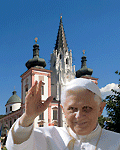ABSTRACT
At the moment, there are 85 independent male convents in Austria. 31 of them carry the title "Stift," and 285 are ordinary convents. 2.500 are members of orders, out of which 417 are friars, 176 are priest candidates, and 34 are novitiates. The working fields of the orders in Austria are as various as the church life itself: pastoral care, youth work, working at schools, educational work, services in hospitals, in social care and in mission. The convents called "Stift" have the legal and the pastoral responsibility for 422 incorporated parishes. Another 190 parishes have been entrusted to the orders, so that 40% of all parishes are taken care of by order priests. The picture of the church in Austria is significantly shaped by the presence of orders.
______________________________________________________________
At the moment, besides a few small diocesan communities, there are 85 independent male convents in Austria. 31 of them carry the title "Stift," and 285 are ordinary convents. They are all combined in the "Superiorenkonferenz" of all male orders in Austria which was founded in 1959 (www.superiorenkonferenz.at) and coordinates the cooperation with the female orders.
The working fields of the orders in Austria are as various as the church life itself: pastoral care, youth work, working at schools, educational work, services in hospitals, in social care and in mission. The convents called "Stift" have the legal and the pastoral responsibility for 422 incorporated parishes. Another 190 parishes have been entrusted to the orders, so that 40% of all parishes are taken care of by order priests. The picture of the church in Austria is significantly shaped by the presence of orders.
2.500 members of male orders, out of which 417 are friars, 176 are priest candidates, and 34 are novitiates, try hard in all of these working fields: they face the challenges and take the chances.
Working Fields and Challenges
The historical connections between pastoral and economical duties and responsibilities led to a dominant role of the monastic orders in church and societal life in Austria. This life style is still attractive for young people. As a consequence, the Cistercian convent Holy Cross in Wienerwald with its 78 members is having the highest number of members in the last 200 years of convent history. In 1988, a new Cistercian convent could be founded in Bochum Stiepel, Germany. Also other Austrian convents started new convent foundations in foreign countries, particularly after the fall of the iron curtain. In the last 20 years, more than 20 different, mainly newly founded orders settled down in the Archdiocese of Vienna.
The orders with priorities in educational areas, such as universities, educational centers, high schools, and boarding schools are facing economic and personal problems. The male orders in Austria support 17 educational centers. About 65.000 pupils attend one of 324 Catholic private schools which are primarily run by orders. To ensure the future of their vocations and missions, these orders are looking for new and alternative forms of organization. Additionally, numbers of pupils at Catholic private schools are increasing despite a lower birth rate, and some schools even report of the highest numbers ever.
In the course of the "Superiorenkonferenz" an Association of Catholic Order Schools was founded in 1993. 16 schools are members of the association. The first school to be taken over was the "Kollegium Kalksburg" at the southern border of Vienna.
In the male orders, nursing is primarily done by the hospital order "Barmherzige Brüder." The 23 friars and 4.400 employees run 10 hospitals with more than 100.000 hospital stays. Of course, these orders running hospitals, members of the "Arbeitsgemeinschaft Ordensspitäler," are fighting for their survival. Providing about 20% of all available hospital beds in Austria, these order hospitals make an indispensable contribution to society and are thus highly valued. Nevertheless, they receive less money for the work performed and have to throw in millions every year, whereas the state balances the budget of the hospitals under public law. The orders have demanded funding for hospitals according to their performance in vain (www.ordensspitaeler.at).
Also, the traditional missionary orders are facing great challenges. More than 187 missionaries from Austria are still working in developing countries. Large sums of money on the part of the orders have facilitated the development of church communities in southern countries and in east European countries since 1989. The low numbers of vocations and growing challenges in Austria make it more difficult to send missionaries to developing countries. On the other hand, new initiatives like the one called "Jugend Eine Welt" by the Salesians of Don Bosco encourage many young people to engage in social and missionary projects in foreign countries. For the last ten years of its existence, this initiative has supported 450 projects and accompanied 250 young people on their assignment abroad.
Youth work is a priority of orders in Austria. The requirements are coming from usual working fields, such as schools, boarding schools, and parishes. 15.000 to 18.000 children take part in the "Herzogenburger Kindersommer," which takes place in the summer holidays. Especially young people show a certain sensitivity towards the Franciscan ideals. This poses a challenge especially to the orders of the Franciscans, Capuchins, and Minorites, who live according to these principles. With initiatives like "Kloster auf Zeit," "Urlaub im Kloster" (living in a convent for a short time), holidays in a convent, hiking retreats, and convent markets, orders want to raise awareness of their spiritual wealth which they offer to unresting people who are looking for places of piece and spiritual profoundness. In the course of this development, a very successful tourist initiative called "Klösterreich" was started in 1992. In this initiative, 21 convents work together beyond Austrian borders and allow people to look behind convent walls by offering "experiences for body and soul" (www.kloesterreich.at).
Perspectives for the Future
In the light of decreasing numbers of vocations and a growing incomprehension prevailing about convent life, orders in Austria have intensified their efforts in the fields of public relations and communication. The series of city lights with provocative statements about convent life inviting people to talk about the topic on the internet site www.herrgottnocheinmal.at caused great sensation all over Austria. In preparation of this initiative, a campaign was launched in a Vienna daily newspaper with ads to remind the Austrian population of the indispensable and often overlooked services of the orders.
With new pastoral initiatives, such as help services, city prayers and spiritual programs as well as social initiatives, such as taking care of former prisoners, the homeless, HIV-infected, and street kids, orders set a course which is not possible within the fixed structures of a diocese. The strengths of orders lie in their ability to reach beyond borders of parishes in Austria and in the world, and to exchange experiences and personal resources. In the course of history, orders have always inspired laypersons and founded lay orders in their surroundings to share and pass on their spirituality ("Dritte Orden," "Familiaren,"...). Cooperation with laypersons constitutes a necessity and poses a challenge for orders.
According to the Head of the "Superiorenkonferenz," Provost Maximilian Fürnsinn from the Herzogenburg Convent in Lower Austria, the orders in Austria expect an encouragement of convent life from the visit of Pope Benedict XVI. to Austria. In the light of the orders' many services to Austrian society, Provost Fürnsinn reminds that the "Gospels are not just meant for contemplative meditation but as a message to resound in the world." It looks as if the orders are on the right track.
Father Erhard Rauch SDS
General Secretary of the "Superiorenkonferenz" of the Male Orders in Austria




 1
1 

